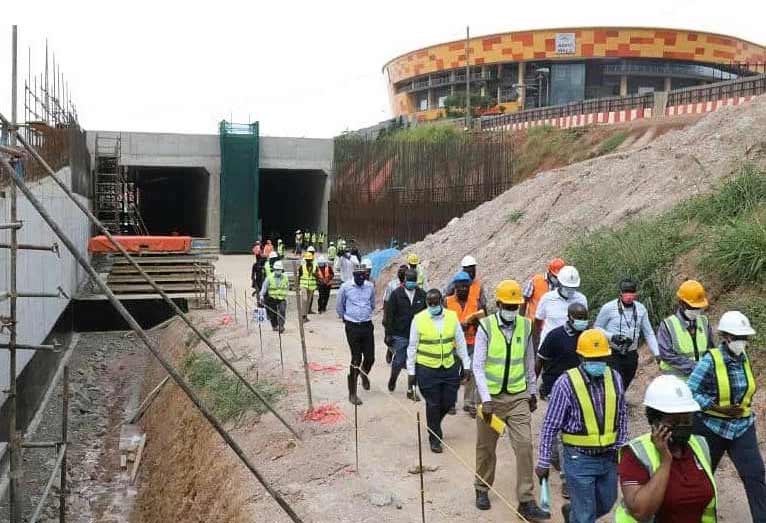If you were a first-time visitor in Kampala city, only 30 minutes on any Kampala Street would be enough for you to appreciate the city’s stature. In those few minutes, you would be stunned by the city’s level of disorganization, lawlessness and the poorly planned infrastructure.
Kampala, which also serves both as Uganda’s commercial and administrative capital, is plagued by a multitude of problems ranging from non-functional traffic regulations, uncoordinated road networks to congestion caused by people, vehicles, Boda bodas and buildings.
Due to poor traffic management, worsened by both road users and traffic police, it is estimated that the average speed of vehicles in Kampala is 26 km/h and that over 24,000 man-hours are lost in traffic jams each year. With that, Kampala ranks among the top 20 African cities with the worst traffic on the continent.
There has been failure to enforce physical planning standards, which has in itself made the city unsafe for its residents. In some locations within the city, you will find residential/commercial buildings, lodges, bars, churches, markets and schools, all crammed in the same place.
On virtually all counts, it is fair to say that the Kampala City Council Authority, Uganda Police and other responsible government agencies, have failed in the management of the city. So many policies have been tried, reinvented and tried again but with little success.
To be honest, I sometimes feel sorry for the city planners because no matter how hard they try, the problems just get worse. And I doubt whether there’s any quantity of resources that can be employed to transform Kampala from its current village-like status to a first-class city. Instead, we should identify a new location, develop it and relocate the capital there.
And if that was to happen, I would, without hesitation, recommend Nakasongola district as the new capital location. Obviously, this is not the first time that a proposal like this is being voiced – in the past, different Ugandan governments, including the NRM, have all expressed some interest in the subject.
I would pick Nakasongola for three key strategic reasons: first is its central location, then security and the fact that it is still a largely virgin area, which would allow for proper physical planning and development.
Nakasongola is one of the most central districts in the Country and can easily be accessed by all other regions. For instance, by road, from Nakasongola to Kampala, the distance is 111km; Nakasongola – Gulu is 221km; Nakasongola – Mbarara is 380km; Nakasongola – Mbale is 340km; and Nakasongola – Entebbe is 160km.
Nakasongola is close to Kiryandongo district where the mega 600megawatts Karuma hydro power project is being constructed and it is also close to the oil region of Bunyoro. The district boasts an airport, which also serves as the headquarters of the Air Wing of the Uganda People’s Defense Force (UPDF).
With a population projected at 217,648 persons in 2020, the district covers 3,424 square kilometres (sq km), and hence is made up of a population density of only 63 persons per Sq Km of land. Kampala, on the other hand, had an estimated population of 3,298,000 persons in 2020 covering 190 Sq Km of land.
Kampala is suffocating partly because, like many cities founded by colonialists, there was no effective strategic planning, particularly with regards to population growth – the city was originally planned for a population of 150,000 persons. A 2017 World Bank report projected that Kampala’s population will be 12 million persons by 2050.
Certainly, such a move wouldn’t come without challenges. In Tanzania, it took nearly 50 years to realize the dream of relocating their capital from Dar es Salaam to Dodoma. The idea was birthed in 1973 under the leadership of their founding President Julius Nyerere but only materialized in 2020 under the late President John Magufuli.
Their initial approach was to create a Capital Development Authority, which would develop the essential infrastructure and move the government step after step over a period of 10 years. And by 1983, the whole government was supposed to have moved to Dodoma.
Several experts attributed the delay to a number of factors, including a lack of resources – especially in the light of adverse national economic problems – feet-dragging by government officials, the attraction of Dar es Salaam, and the lack of political will.
Prior to 2015, the whole idea of shifting the capital was in a limbo. But under the late John Magufuli’s presidency, between 2015 and 2020, it was revived and the approach changed as well. A move was made to immediately build the necessary infrastructure; resources were identified and allocated to government agencies; and strict deadlines were set.
In moving its national capital to a new location, Tanzania was joining a number of other countries in and out of Africa. Examples include; Burundi (from Bujumbura to Gitega), Malawi (from Zomba to Lilongwe), Nigeria (from Lagos to Abuja), and Cote d’Ivoire (from Abidjan to Yamoussoukro).
In Nigeria, until 1991, Lagos, the largest city in Nigeria, was also its capital. Lagos was very congested (it is the most populous city in sub-Saharan Africa), and that was among the reasons for the move. While Lagos has continued to grow organically, Abuja is a much better planned city, with some of the best road network in Africa.
Uganda should, therefore, learn from these countries, take the bold step and implement, in a phased approach, the relocation of the national capital to Nakasongola (or any other new strategic location). Let’s stop wasting valuable resources attempting to reorganise and restructure Kampala!









